As the political hegemony of the ANC has frayed, elite forces have increasingly funded an array of opposition parties to shift power more in their favor, writes Eugene Puryear.
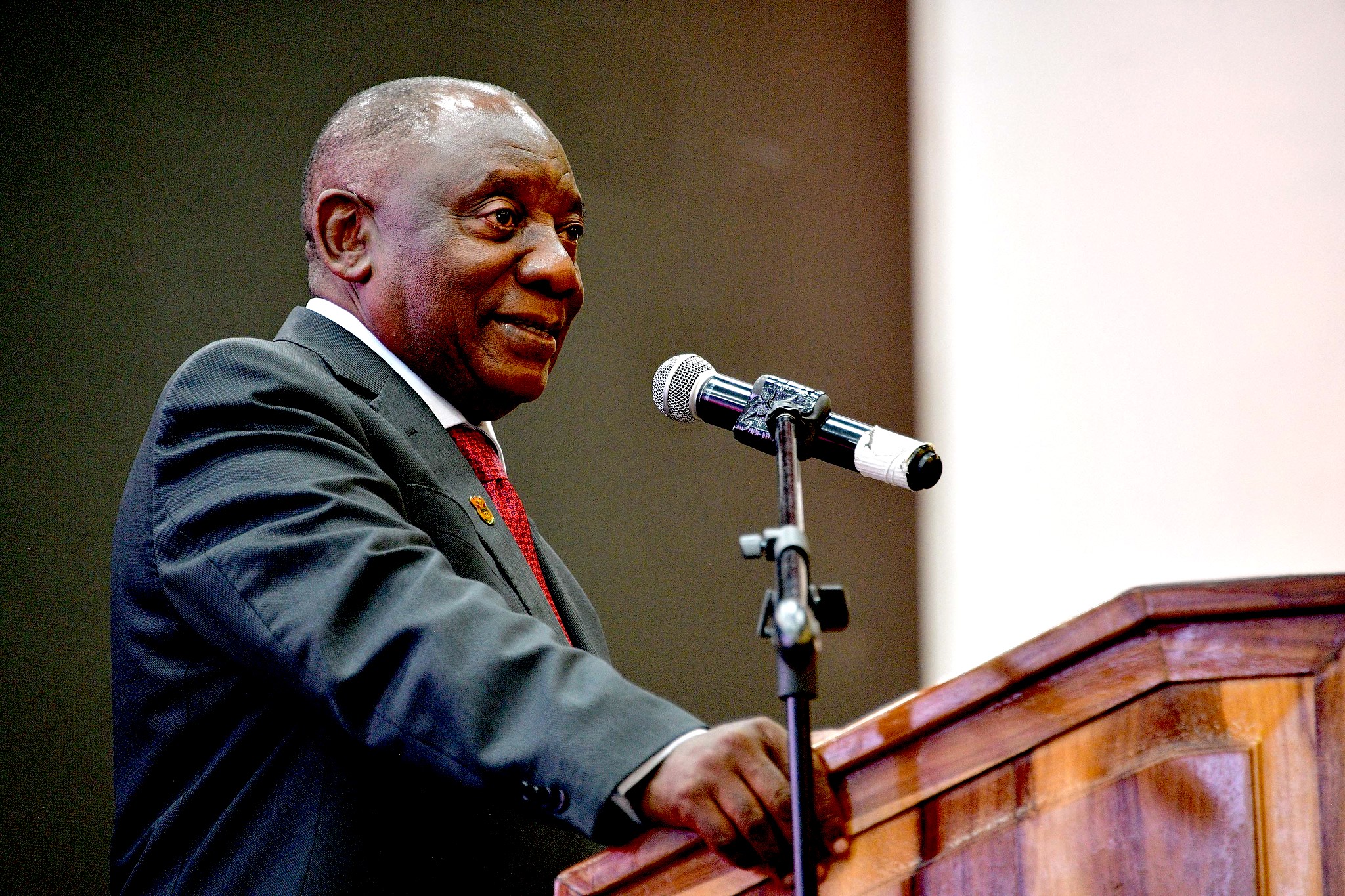
South Africa President Cyril Ramaphosa delivering an address at University of Johannesburg, Soweto Campus in May. (GovernmentZA, Flickr, CC BY-ND 2.0)
By Eugene Puryear
Peoples Dispatch
 Thirty years after the first democratic elections in 1994, South Africa finds itself at a political inflection point.
Thirty years after the first democratic elections in 1994, South Africa finds itself at a political inflection point.
The 2024 election [on May 29 for the National Assembly and provincial legislatures] saw a collapse in the vote of the ruling African National Congress, which had only 40 percent of the vote, 17 percentage points lower than 2019. The ANC gained less than a majority of votes cast for the first time since 1994.
Turnout was also down 6 percent. The loss was even more notable as it followed an acrimonious pre-election split in the ANC with former President Jacob Zuma leading a break away party (MK Party).
The election was also a watershed for the various right-wing parties. They cemented their minority — but growing — role in the political landscape.
In the wake of the results the political scene is being roiled by negotiations for the first coalition government since the end of apartheid.
At stake is whether or not South Africa will make rapid progress on poverty and inequality and play a role advancing the struggle to end unipolar U.S. hegemony, or whether it becomes a neutered node for the eroding Western status quo and sends its population even deeper into a state of deprivation.
Rejection of Political Establishment
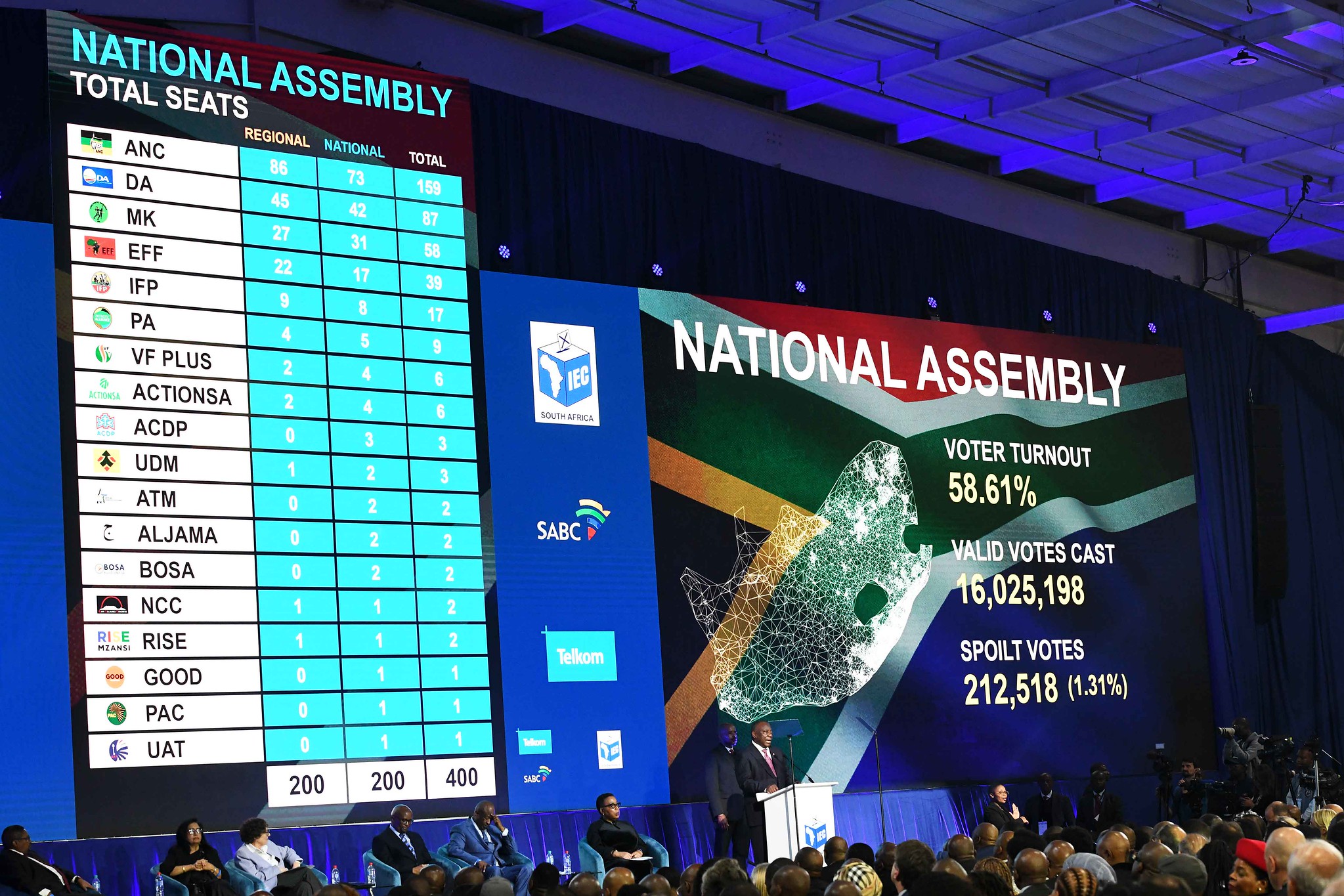
Official election results board during the announcement ceremony on June 2 in Midrand in Johannesburg. (GovernmentZA, Flickr, CC BY-ND 2.0)
South Africa’s voting age population is roughly 42 million, just over 27 million of whom are registered. Fewer than 17 million cast ballots. In other words, abstention was the biggest winner of the 2024 election.
No political party can claim to represent more than 16 percent of the adult population. Viewing the elections from the point of view of the voting age population here are the top four parties:
- African National Congress: 15.5 percent
- Democratic Alliance: 8.4 percent
- uMkhonto we Sizwe (MK): 5.6 percent
- Economic Freedom Fighters: 3.6 percent
Capitalist media is principally framing the election as a rejection of the ANC government. But the results show that, in reality, the election was a rejection of the entire political establishment and the idea that casting a ballot can bring positive change — a reflection of the dire state of the country.
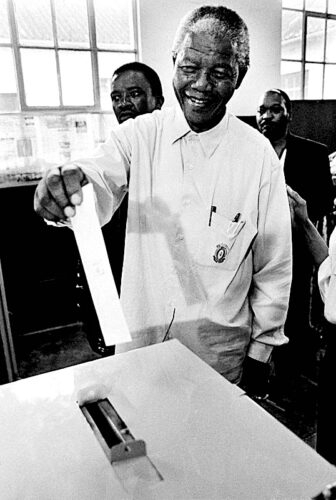
Nelson Mandela casting his vote in Ohlange School, Inanda, Durban, during the 1994 elections; the first time he had voted in his life. (Paul Weinberg, official photographer for the Electoral Commission of South Africa, Wikimedia Commons, CC BY-SA 3.0)
South Africa’s mineral wealth is generating at least $125 billion a year, with at the least $2.4 trillion worth of minerals still left in the ground. The companies on the Johannesburg Stock Exchange, Africa’s largest, were worth roughly $1 trillion in 2023.
However, 10 percent of the population owns 80 percent of the wealth, with predictable results. Unemployment officially stands at 32.9 percent; 45.5 percent among those 15-34.
Fifty five percent of households do not have running water and 34 percent still don’t have flush toilets.
Fifty percent of the country lives in poverty based on official statistics; 65 percent in rural areas.
Further, by some measures, South Africa has the highest level of income inequality on earth. In addition, 75 percent of farmland is still owned by whites.
This is also reflected in the results; 64.2percent of those who chose to vote went for the ANC, MK or EFF — all of whom pledged to address these issues more resolutely.
The ANC told voters they would “end poverty by 2030.” MK and EFF promised voters they will expropriate land without compensation and nationalize mines and banks.
Significantly expanded access to healthcare, housing and education, at little to no cost, are touted by all three.
Internationally all three have been offering support to Cuba, Palestine, Venezuela and China. EFF leader Julius Malema even pledged to fund Hamas, while MK additionally pledged to prioritize solidarity with Russia.
Whatever one might say about the sincerity or feasibility of particular parties or plans, a clear majority of South African voters are looking for policies that seriously roll back poverty and the legacies of settler colonialism while taking an anti-imperialist approach to international relations.
Forces at Play
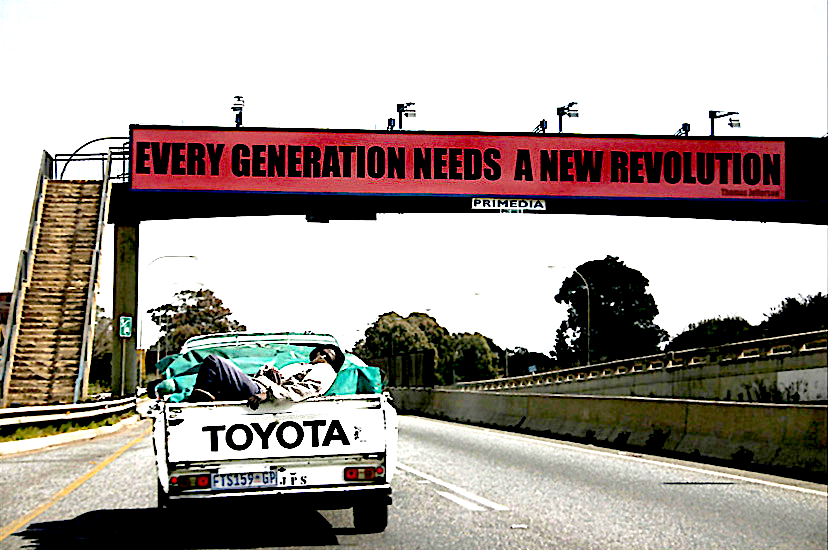
Napping in the bed of a pickup truck moving on a post-apartheid Soweto highway, South Africa, Freedom Day, 2006. (Gary Mark Smith, Wikimedia Commons, CC BY-SA 3.0)
Rising right-wing forces represent an attempt by elements of the ruling class to resolve the contradictions between capital and state under ANC rule.
The price for the end to de jure apartheid was to leave the white economic aristocracy in place. This was not an ideal situation for the elites however. They had to acquiesce to a combination of demands.
First, the demand for Black inclusion at elite and “middle class” levels, and second the need to address at least some of the demands of the poor, trade unions and communists that play significant roles in internal ANC politics.
As the political hegemony of the ANC has frayed, elite forces have increasingly funded an array of opposition parties to try to shift the balance of power more in their favor.
At the core is the Democratic Alliance (DA). It is funded by ruling class families such as the Oppenheimers and the “newer” money of some such as gambling boss Martin Moshal as well as some of the largest pro-business political parties in Germany and Denmark.
Similar donors have spent lavishly in support of parties such as ActionSA and Build One South Africa, that try to present a more “Black” face on DA-like policies. Others like the Patriotic Alliance, also emanating from elements of the business community, are rooted in a more right-wing “populist” approach, stressing in particular an anti-immigrant politics, designed to appeal more to the Black poor.
These pro-capitalist currents are seeking to exploit the decline and fracture of the ANC to open space to force the ANC into a governing agreement where the demands of “the market” are given a greater pride of place and set the stage to overtake them in future elections.
The ANC is engaged in its own balancing process between its embeddedness with the global imperialist economy and the desire of its base to rapidly accelerate economic transformation. The latter is unlikely to happen without leaning into the shifting sands of multipolarity, further heightening the contradictions with the Western-orientedbusiness elite.
Coalition Politics
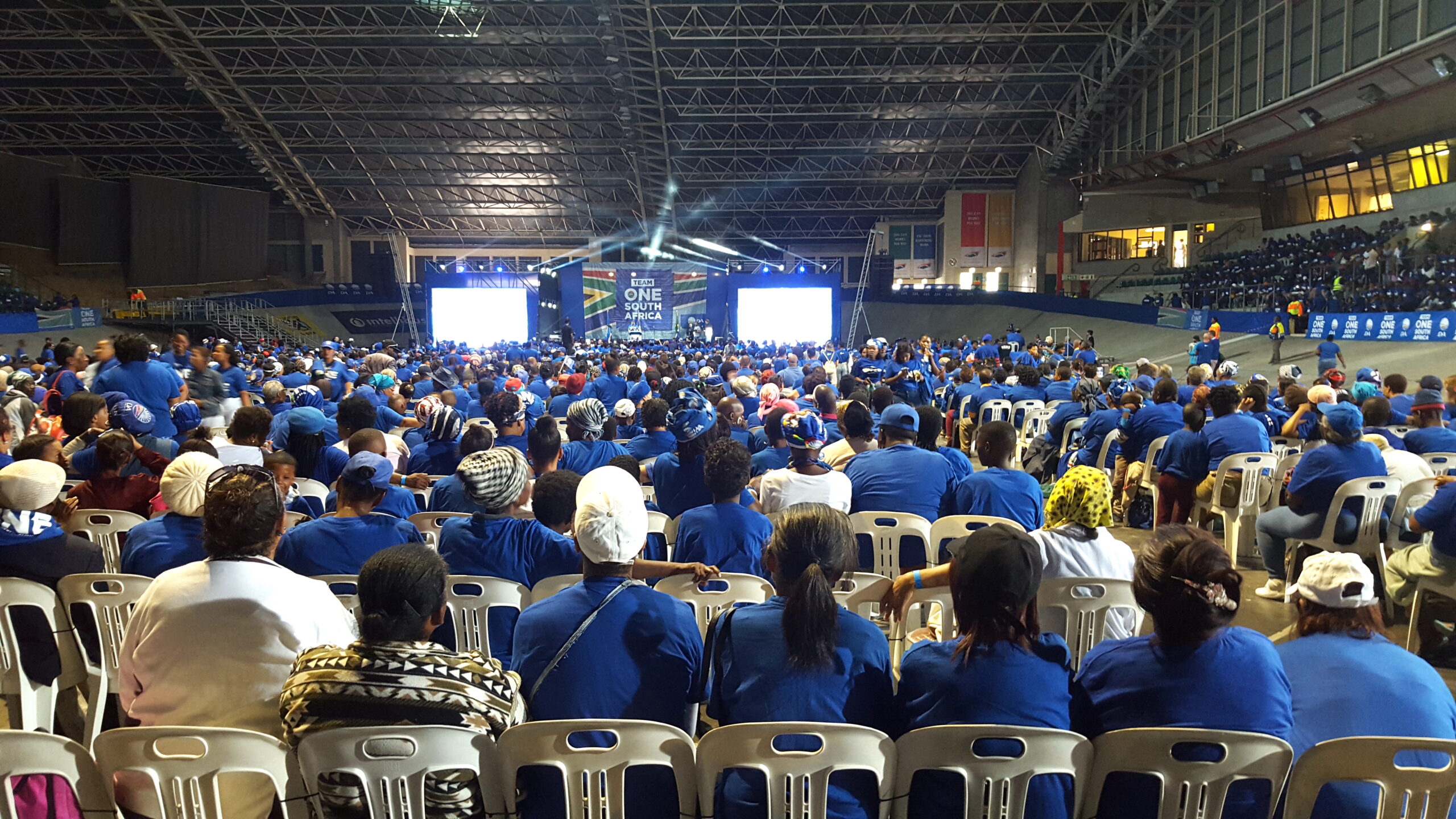
Democratic Alliance’s Western Cape rally, 2019. (Lefcentreright, Wikimedia Commons, CC BY-SA 4.0)
This is the context underlying ongoing coalition negotiations. “The markets” and the business community are weighing in heavily to create some sort of coalition government between the ANC and the DA.
This would be a decisive shift to the right that would undoubtedly involve further privatization of state-owned companies, implementation of austerity budgets, as well as a cooling of relations with the BRICS, Cuba and Palestine. In other words, it’s likely to take the country in the opposite direction from where over 60 percent of the electorate would like it to go.
However, other potential coalition options present challenges for the ANC. Both the EFF and MK are splits from the ANC. Pro-capitalist forces in the ANC fear an alliance with either or both parties will make it more difficult to impose the dictates of capital, and in the case of the EFF in particular, strengthen the hand of socialist ideas in the government.
Further, the acrimony that exists between these parties also creates hurdles to a coalition agreement.
A number of ANC leaders and the Communist Party have been publicly against an alliance with the DA, and it seems like such a deal would likely further split the organization. The Patriotic Alliance and the Inkatha Freedom Party have also been open to coalitions with the ANC and, alongside the EFF or MK, could easily create a parliamentary majority.
The outcome of these negotiations will be far-reaching. Will South Africa move towards eliminating poverty and stake out its own ground in a multipolar world order? Or regress towards a role more akin to the former apartheid regime as a node for the West in Africa and beyond?
Eugene Puryear is a journalist at the U.S. movement-centered Breakthrough News and a member of the Party for Socialism and Liberation.
This article from Peoples Dispatch was originally published in Liberation News.
Views expressed in this article may or may not reflect those of Consortium News.
Please Donate to the
Spring Fund Drive!



One needs to understand that there is no reliable and truly democratic socialist political party in South Africa today. The SACP seems to have just gone along for the convenient post-1994 ride and lost any right to call itself a communist entity long ago. The populist EFF wraps itself loudly in progressive sounding rhetoric but has little real connection to the working class. Jacob Zuma’s MK party which broke away from the ANC is tainted by serious corruption as is its founder. So the next best option is just to seek stability, a reduction in the corruption and crime, and the improved delivery of basic services, more jobs etc. So as counter-revolutionary as it may seem at first sight, a so-called “government of national unity” that forces politicians from a spectrum of ideologies to face the challenges, may be the best we can hope for in SA today. Sadly, I cannot be confident that this will work again as it did – to some degree – in the first transitional government under Nelson Mandela (which was also a government of national unity ). It is unfortunately likely that the underlying economic inequalities which have never been addressed since 1994 will not be challenged.
Your points are well taken, but do you not recognize that most democratically elected governments are coalition attempts at “government of national unity”… Canada, Mexico, Israel, Germany, France to name a few in the headlines; unlike in the U.S., where the historically institutionalized two-party political system has subtly, and undemocratically, been done away with; simply merged, by clandestine legislative maneuvers, into a single Duopoly entity of oligarchs and plutocrats?
National unity has been the objective of the powerful, ever since the concept, and the actual realization of Nation States came about.
Speaking of political corruption!!!!
Hark hark the moneylenders are loose again, barking for a larger share of the pot of gold at the end of their rainbow coalition of elites.
As the article describes so well, de facto apartheid never ended in South Africa, and this is evident to anyone who visits the country for even a few days. In order to be allowed into government by International Capital, the ANC turned its back on every promise made in their Freedom Charter, including the pledge to nationalize the banks and mines. While doing nothing to reign in economic exploitation or white supremacy, they have managed to raise a few of their members into the upper ranks of the capitalist class. The current leader, Ramaphosa, will be remembered as the butcher of Marikana, a massacre of striking miners no different from Sharpeville. Why they sold out so enthusiastically is something I’ve never understood, but it’s evident by this time that nothing progressive (let alone revolutionary) can be expected from them. The collapse of their votes was therefore long overdue in my opinion. If there’s any hope at the electoral level, it can reside only with parties like the EFF (but the people I know mistrust them as well.)
CLARIFICATION. I don’t mean to minimize the obstacles that the ANC faced when they assumed government. With the recent collapse of the Soviet Union they were alone in facing a triumphant Euro-american capitalism, and almost the whole world had entered a period of reaction. What needs explanation, however, is why the ANC swung so quickly and so sharply in a neo-liberal direction without any attempt to deal truthfully with their supporters.
Good Lord! All those millions of non-voters! Having lived a long while here in the USA, the kiss of death to
government’s redress of citizens’ needs is privatization. Worse than Covid. More power to the people. May
they fight like hell to own the government they need and desire. And the gambling king and his fraternity ilk
taste the full intensity of being side-lined and defeated.
South Africa’s Foreign Minister has been such a leader in breaking western control over the African Continent, it’s hard for me to accept South Africans’ apathy toward their government. How’s the mass media there? Is it owned by the wealthy elite with special interests as it is in the US? Money goes a long way in creating apathy where it wants.
A Paean of Praise for ‘Open-mindedness’ in these Contemporary Dark Times of Covertly Enforced Censorship, in a So-Called Western ‘Free World’, in Overt Decline.
For a more comprehensive, deeper, and fuller understanding of South African politics; for anyone of those who may have this keener interest, other than latter-day journalism’s empirically obvious by now, though well-intentioned, by the American journalist author’s perspective. For lay readers, it is disjointed if more critical, in-depth insights are the objective; as well as offering only scantly cited statistics for backup in the always evolving South African saga, dating way back, before even the very early 1990’s.
It is recommended they read Breyten Breytenbach’s: The Memory of Birds in Times of Revolution. He is one of Africa’s more astute ‘White’ Afrikaner Expatriates.
For those, perhaps too otherwise occupied, the suggestion is to at least read the 3rd essay of the compilation: Fragments from a Growing Awareness of Unfinished Truths, written at Stellenbosch, dated August 1990, in the very midst of South Africa’s cataclysmic transformation, for ‘White’ Afrikaans speaking, as well as English speaking persons, in the now erstwhile Apartheid state, which does NOT directly incorporate all of Apartheid’s declensions – political, economic, social, and most egregious overall, the legal.
It has taken the American constituted form of democracy 247 years to bring the country to the point of political, economic, societal implosion that it is now approaching.
Yet it is expected that a country such as South Africa, after a mere thirty years of ‘sovereign’ political independence, should have already attained “a shining city on a hill status”!
The only country, for too many years, proclaiming to be the lone actual shining city on a hill, is the only country in the entire world that has ever used Nuclear Weapons to destroy ‘other’ human beings.
South Africa, on the other hand, being the one and only country ever to be successfully and peaceably coerced to give up its weapons of Nuclear Deterrence? Ever wondering why and how this came about!!!.
This highlights the very daring nature of South Africa in directly challenging the one and only country in all of South West Asia; and the American hegemon’s protege/beneficiary, to be permitted to maintain (clandestinely) one of the world’s largest Nuclear Arsenals, by bringing suit to the International Court of Justice, openly objecting to Israel’s ongoing genocide against non-Jewish Arab Palestinians.
If this comment reads as a cuff and jolt to closed minds, that is its intent.
“The price for the end to de jure apartheid was to leave the white economic aristocracy in place.”
Once the ANC got into bed with the World Bank and IMF, it lost its way.
“…by some measures, South Africa has the highest level of income inequality on earth.”
That is not what the ANC spilled blood for.
Just as Putin is the leader of Russia, he is not Russia, so too, on the opposite side of the coin, Mandela was not the ANC.
How else would the ‘whites’ have ceded their Apartheid system (cash cow) than by the ANC agreeing to be coerced into forfeiting and surrendering South Africa’s Nuclear arsenal in the transfer of power.
The West (U.S.) would never permit ‘black’ South Africa to possess its own nuclear deterrence just as today, they will never permit western Asia to be a nuclear free zone, by forcing Israel to surrender its nuclear arsenal.
‘White’ South Africa is the only country to have given up its nuclear arsenal. What was the quid pro quo in the deal to relinquish political power?
The ‘new’ truly democratic ANC government would never have had an economic chance to get off the ground had it not agreed to the traps of the World Bank and IMF.
As I’m sure you know, ‘white’ capital still controls 80%? of the economy.
“At the core is the Democratic Alliance (DA). It is funded by ruling class families such as the Oppenheimers and the “newer” money of some such as gambling boss Martin Moshal as well as some of the largest pro-business political parties in Germany and Denmark.”
Staggering. Would Germany and Denmark in the Western Minority World tolerate. such blatant foreign interference in their politics?